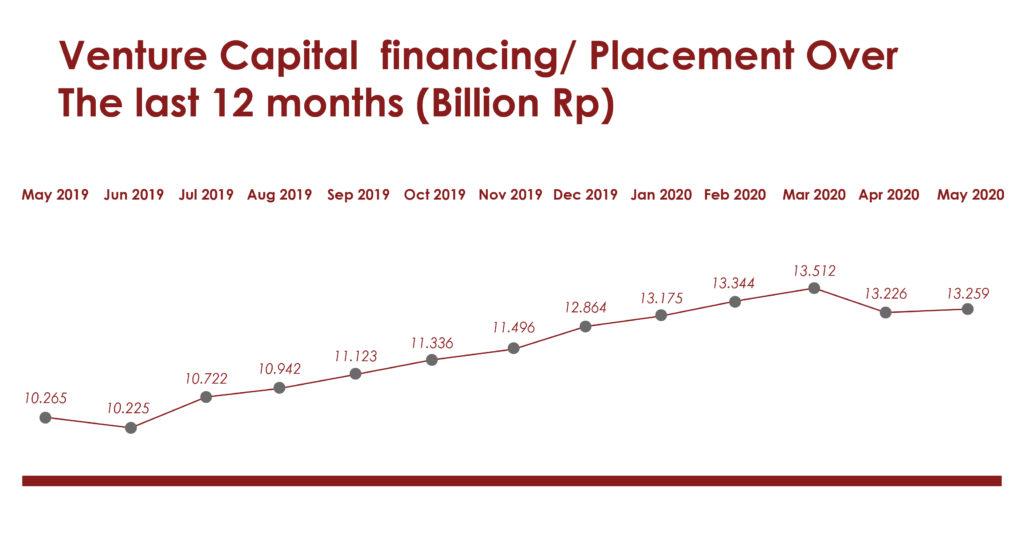With over 2,000 start-ups, Indonesia has over the past few years been viewed as one of the top destinations for venture capital and private equity firms. The country ranks 5th in global start-ups rankings, attracting more US$8 billion (S$11.2 billion) in funding from 2016 to 2019 cross 696 deals.
Start-up founders such as Nadiem Makarim, co-founder of Go-Jek; Ferry Unardi, co-founder of Traveloka; Natali Ardianto, co-founder of Tiket.com; William Tanuwijaya, co-founder of Tokopedia and Achmad Zaky, co-founder of Bukalapak are not only extremely wealthy but have attained a rock star status in Indonesia.
Given the lure of potential new unicorns, funds have continued to flow into the country’s start-up sector despite a sharp economic contraction in the second quarter of this year. Latest data available from the Financial Services Authority (OJK) showed that to May 2020, venture capital financing/ placement reached Rp13.07 trillion (US$898.28 million), an increase of 28.5% from Rp10.17 trillion (US$698.96 million) from May 2019.

According to market players, the reason behind this strong showing despite averse macro-economic conditions is the push towards greater digitalization brought on by Covid-19 pandemic. Even companies in traditional sectors such as mining and construction have adopted greater use of technology, thus benefitting start-ups servicing such sectors.
Start-ups in transportation, storage and communications saw 205% growth year on year while those in business services grew by 17.15% and those in construction saw 55% growth. Traditional start-up sectors such as e-commerce and market place also continued to grow and attract new funding.
But going forward, investor focus will shift from e commerce and F&B start-ups to those who are involved in delivering essential goods, edutech, healthcare and agritech supported by government expenditure.
Edward Chamdani Managing Partner of Ideosource Venture Capital admitted that several of the companies in his portfolio that were in hospitality, B2B and entertainment have been hard hit by the lockdown enforced by the government.
“Covid-19 has forced people to stay home and switch to watching television or video on demand, “ he noted. “Start-ups in the hospitality sector have had to cut staff, in some cases up to 70% as demand has dried up and overall the pandemic has caused the market to shrink as restaurants and malls have been forced to shut or shorten operating hours.”
However, the crisis has unearthed new opportunities for start-ups if they can pivot quickly. As more and more corporations move to serve their customers and clients online, start-ups well positioned to leverage on this trend stand to benefit.
“Several sectors such as agriculture, food and FMCG, and e-marketplace are growing and I see players such as Tokopedia and the others getting stronger in terms of expanding their customer base,” Chamdani noted. “One of the start-ups we have invested in, electronic marketplace platform Bhinneka has added more categories for our corporate clients from electronics to medical and health products as well as consumer goods.”
As such, Ideosource has no plans to cut funding in the immediate future and is in fact searching for new investment opportunities. The company recently invested in Inacom, an E2E agrocommodities platform and Petani Kakoa Lampung, a company established to help cocoa farmers in Lampung to improve productivity.
With online education expanding fast as students opt to study from home, edutech start-ups are gaining attention. Ideosource recently invested in the International Design School founded by Andi Surya Budiman.
Another niche segment is online certification. With a deluge of online courses, those that offer certification or tie up with internationally recognized education institutions are likely to attract more customers.
“The factors that drive our investment decisions at the moment are understanding changing market conditions,” he added. “We are looking at recession resistant sectors such as agriculture and education and start-ups that offer tech-based solutions in these sectors.”
Donald Wihardja CEO MDI Ventures Telkom is also upbeat about the investment climate in Indonesia for start-ups. He is focusing on health, logistics and ecommerce given the strong growth potential of these sectors.
“The Covid-19 pandemic is the best Chief Transformation or Information Officer in the world as it is pushing digital transformation and forcing CEOs to move much faster,” he noted. “Covid-19 is accelerating digital transformation adoption and Indonesia should not miss this opportunity to built its digital infrastructure.”
As the Covid-19 pandemic exerts an economic toll on Indonesia, many start-ups are not likely to survive. Already well known fashion start-up Sorabel has announced winding up operations as cash dried up while others such as EatEasy and Airy Rooms are also likely to close as consumers cut back on travel and entertainment expenditure.
Industry watchers note that over the next six months, investors will focus on mature players with solid tract records such as Ovo and Gopay rather than new start-ups that have a long gestation period. As the emphasis shifts to essential spending rather than discretionary spending, venture capital firms are also re-evaluating their investment priorities.

